
by Olga Mecking | Sep 8, 2014 | Cultural Differences, Culture, Netherlands, World Motherhood
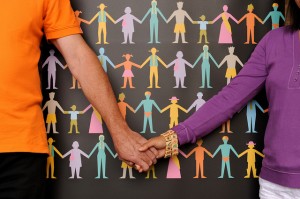 As a trainer in intercultural communication and mom to multilingual children, I am always taught to accept other cultures, various ways of thinking and perspectives of looking at the world.
As a trainer in intercultural communication and mom to multilingual children, I am always taught to accept other cultures, various ways of thinking and perspectives of looking at the world.
I may of course have a lot to learn about tolerance but I like to think that I’m doing a decent job at understanding all the different viewpoints. But there is a place where my tolerance stops.
One thing I have no understanding for is woo and quackery. The argument, “but indigenous tribes in enter-remote-location-here have been using this plant for ages and it cured all diseases” is useless when scientific research shows that said plant doesn’t work at all or can even be poisonous.
Unfortunately many people believe this stuff and it can have dangerous consequences. And then it gets worse.
Advocates of female circumcision claim that it’s a part of their cultural heritage and without it women feel they are not “real” women. But any cultural tradition that is based on suffering and disfigurement of the human body should be gotten rid of very quickly and no amount of cultural appreciation will suffice for me to accept such a tradition.
Let’s also remember that culture, while it brings people together and helps them get along better and makes sense out of their environment, can also smash our individualism and make us unhappy.
But as dangerous and untrue these claims are, it gets worse. Women get killed, raped, disfigured and humiliated every day. They are afraid to go out on the streets in the evenings; they take great care in picking their clothes out of fear of being proclaimed “indecent”.
In many parts of the world, people kill each other over cultural, religious or political differences which are often minor. In some parts of the world, certain people are considered worse than other people.
Should we just accept it as it is, saying, “It’s another culture, we shouldn’t do anything about it, we should just appreciate our differences”? I agree that cultural diversity is great- and I myself benefit tremendously from it. But shouldn’t we be drawing a line somewhere? And if so, where should we draw it?
In her book, “Medaliony”, Polish writer Zofia Nałkowska tries to make sense of what happened during WWII in Poland. She could have put blame on the Germans, the way many Polish people did and still continue to do today. But she didn’t. Instead, she wrote, “People prepared this fate for people”, or in a better translation, “humans prepared this fate for humans.”
I guess that line should be drawn when it’s not about cultural differences anymore. When the action in question can’t be explained by traditions, cultural heritage or tolerance. In short when it’s about humans hurting or killing other humans.
A common criticism of the understanding cultures approach is that deep inside, we are all the same. Of course there are some things that are universal: we are all humans, we have hearts and brains and skins. We’re so afraid that if we start mentioning our differences, we will start comparing ourselves to others and consider some of us better.
I beg to differ. Of course we are all humans and some of the things we do are universal. But the truth is that we are an extremely varied species, on a wide spectrum of sizes, skin colours, temperaments and cultural and social backgrounds.
Saying we are all the same eradicates the wonderful differences in us and I think that’s a shame. We are all humans and all different, and if one human kills another human it’s a tragedy.
Sadly, such tragedies happen all the time. Recently, the three boys: Eyal Yifrcah, Gil-Ad Shaer, and Naftali Fraenkel disapeared and were later found dead. The #BringBackOurBoys campaign, while beautiful, did nothing to revive them. Then, the flight MH17 crushed in Ukraine. Expatica Manager Antoine van Veldhuizen was on that plane. He and other victims of the plane crash will be hugely missed and the Netherlands are in mourning.
We like to say that humans are great with making sense out of tragedies. They need to feel that they suffered for a reason. Again, I beg to differ. Suffering and pain don’t make sense. We can certainly make sense out of them but to do so means to accept that and this is something I’ll never ever do.
Humans killing humans doesn’t make sense. And no amount of cultural appreciation classes or tolerance will convince me otherwise. Before you see someone as a part of a certain culture or religion, you’d better see the individual human first.
Our differences shouldn’t divide us. They should bring us together.
But above all, being different is no excuse to kill other people.Because nothing ever is an excuse to kill, nor should it be.
Instead, killing other people should be considered the shocking and saddening tragedy that it is and nothing should ever change that.
This is an original post for World Moms Blog by Olga Mecking, The European Mama, from the Netherlands.
Photo credit: DIBP images. This picture has a creative commons attribution license.
Olga is a Polish woman living in the Netherlands with her German husband. She is a multilingual expat mom to three trilingual children (even though, theoretically, only one is trilingual since she's old enough to speak). She loves being an expat, exploring new cultures, learning languages, cooking and raising her children. Occasionally, Olga gives trainings in intercultural communication and works as a translator. Otherwise, you can find her sharing her experiences on her blog, The European Mama. Also take a while to visit her Facebook page .
More Posts - Website
Follow Me:




by Ann Marie Wraight | Sep 1, 2014 | Greece, Interviews, Motherhood, Parenting, Travel, World Interviews
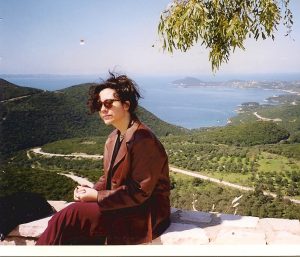 Where in the world do you live? And, are you from there?
Where in the world do you live? And, are you from there?
Well, this may be the most difficult question to answer!
I’ve lived for the last twenty years in the northwestern mainland area of beautiful Greece. By birth I’m British as were my parents and grandparents, although I’ve had dual nationality – British/Greek – for about a decade. I was born in England but my family relocated to Australia when I was about 3 years old and so I started my primary education in Sydney. Due to family problems, we left Sydney when I was about 8 and returned to the UK where I was based until I finished my A levels. I decided to go to Berlin, Germany to do my gap year before starting my degree course. I was so intrigued by the culture, language and endless opportunities in Berlin that I extended my “gap year” to THREE gap years before finally starting my degree course in the UK! Once I’d gained my BA (Hons) qualification I immediately came to Greece on a teaching contract and have lived here ever since!
So, to cut a long story short, let’s say I’m a Brit by birth, Aussie by nature with a sprinkling of Greek/German regarding my greedy appetite for tasty food and chilled beer!!!
What language(s) do you speak?
My native language is of course English and I have a high level of modern Greek and German. Until I was in my 20’s my French was passable but I honestly think that Brits shouldn’t try to speak this flowing and poetic tongue unless they REALLY make an effort to get the accent RIGHT! I haven’t been to France since my 20’s so, alas, I’ve probably forgotten most of what I knew.
When did you first become a mother?
I first became a mother in my early 30’s which is relatively late for Greek standards although fairly normal for British women.
Are you a stay-at-home mom or do you work?
The idea of not working on a permanent basis absolutely TERRIFIES me! I’ve worked on both a volunteer and professional basis since I was 15 and if I have periods of a month or more when I stay at home it ends up in a bout of depression. Always. Short holidays are pleasant but not for extended periods of time. That’s why I continued teaching right up to the birth of both my boys and continued to work from home (doing private tuition) while I breastfed them. I love teaching and being with teens gives me both pleasure and lots of positive energy. I’m addicted to it and believe that staying home and being a full time mother is MUCH harder and challenging than working outside the home!
Why do you write?
I learnt to read and write before I went to school as I was one of those tiring kids who could never sit still. Books and words fascinated me and when I was 5 I made a small folder with VERY short stories and plays! No piece was more than 50 or 60 words but I thought I was a Genius! I used to force my brother and friends to act out the scenes and dialogues I wrote, fantasising about how much smarter than them I was!!! What an obnoxious and bossy child I was!
The death of my mother from cancer when I was six and a half certainly knocked me down to earth and cured me of my bossiness, though. I hardly spoke at school and almost never at home for about 2 years after that so writing became my main form of communication with the outside world. Books and words got me through those terrible years. Writing was my escape from cruel reality.
In my adult life, writing is my main means of socialising as I live in a fairly isolated region of mainland Greece. I have 3 herniated spinal discs which means I have to limit the amount of driving I do. I don’t have the luxury of just popping over to a friend’s house for a coffee as it entails at least an hours’ drive.Too painful for me! So, writing saves me as I can express myself on a practical, emotional and creative level! I’m working on a children’s book at the moment, too, so my creative side is being constantly fed! Basically, writing keeps me sane!
What makes you unique as a mother?
Every mother has her own stamp or parenting style. When I was pregnant I used to really worry about how I would interact with my child. Every mother wonders about that of course but remember, my own mother had passed away when I was six. I didn’t have a role model or a standard to follow. My father didn’t remarry and he worked full time so it was up to me to look after my brother, cook, clean and of course get good grades at school! So, in a way I was a mother to my younger brother from a VERY early age. I went from being a brat and know-it-all to a mini-momma by the age of 8. I didn’t really have a typical childhood at all!
This is what makes me unique as a mother. I am very wary of over pushing my 13 and 14 year old sons in a very competitive culture. I’m hyper-aware of their emotional state and they can REALLY talk to me about most of the things that bother them. I believe the way I had to grow up has made me more empathetic and sensitive than most European mothers are.
What do you view as the challenges of raising a child in today’s world?
Wow- the list is endless!!!
In my house a major challenge is to encourage our boys to be open-minded and embrace people of other cultures, religions and world views. Most Greeks tend to be pretty narrow minded towards anything or anybody non-Greek! From primary school level especially, there is a very negative attitude towards children from certain countries such as Albania and Bulgaria. My blood really boils when my boys come home and repeat racist comments they have heard at school!
Despite such easy internet access nowadays to a plethora of global information, many parents and teachers in Greece are ignorant of other cultures, education systems and religious views. In an attempt to combat this, we hope that by using reason and examples of our personal friends from these cultures, we can get our boys to see that these stereotypical accusations are ridiculous. One of the most trustworthy employees we’ve ever had was from Albania and one of my closest female friends looks like a model, has the heart of Mother Theresa and is a Mathematics Professor at University level. She’s also Albanian!
So by our own personal interaction and logical arguments, our children see for themselves the opposite of what they sometimes hear and experience at school.
We have also told our boys about experiences I had when I first came to Greece and they feel shocked when they see how it is when someone they love is at the receiving end of an unjust system.
I’ve encountered many problems over the years both social and legal. We talk to our children about all these past experiences and encourage them to put themselves in other peoples shoes before acting. Also, the family saying is ALWAYS be fair and just. We try to teach our boys that if we treat others as we would like to be treated, then the world would improve dramatically!
How did you find World Moms Blog?
I was introduced to the blog by a very dear friend and writer/blogger, Heather Kelly. She has known me for some years and suggested that I might enjoy reading about motherhood all over the globe! Cheers Heather!
Thanks for inviting me to this super blog! My childhood trait of talking about myself has obviously never been subdued!
Take care wherever you may be!
World Moms Blog welcomes Ann Marie. Photo credit: Ann Marie Wraight.

Having lived in 4 different countries, Ann Marie finds it difficult to give a short answer about where she's from. She regards herself: Brit by birth, Aussie by nature, with a sprinkling of Greek and German based on her insatiable appetite for tasty food and chilled beer!
This World Mom has been married to her Greek soulmate for 16 years and they are the proud but constantly challenged parents of two overactive teenage boys. (She secretly wonders sometimes if she was given the wrong babies when she left the maternity clinic.) She can't explain the fascination and ability that her 13 and 14 year-olds show in math and physics or that both boys are ranked 1st and 2nd nationally in judo. Ann Marie can only conclude that those years of breastfeeding, eating home cooked meals and home tutoring really DO make a difference in academic and physical performance! The family is keeping its fingers crossed that---with the awful economic crash in Greece---continued excellence in math and/or judo will lead to university scholarships...
In addition to writing, enjoying a good glass of wine and movies, Ann Marie also works as a teacher and tends their small, free-range farm in the Greek countryside.
More Posts

by Tinne from Tantrums and Tomatoes | Aug 25, 2014 | Belgium, Motherhood, Parenting, Tinne, Uncategorized
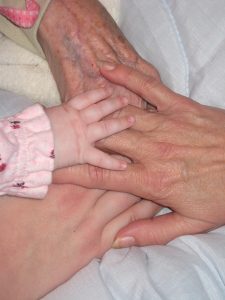 When you become a parent things change.
When you become a parent things change.
Obviously.
Saying that children turn your life turns upside down, inside out and back again is most definitely not an understatement.
Bodily changes, sleep deprivation and related mental breakdowns aside, one of the major changes is the relationship with your own parents. Because in a weird way you are suddenly equals. You are both parents.
Granted, your parents might have a bit more experience on the job, but you might consider yourselves employees of the same company now.
You are the newbie and they are the old stalwarts who will insist on explaining how the coffee machine works. Even though it has only one button. And just like in the office, you each have your own way of going about the daily job that is parenting.
It was my father who pointed this out to me when he remarked that I was a very different mother to my children than my mother was to me.
Of course this is true, mainly due to the fact that I’m NOT my mother (no, really, I’m not my mother, I might have started to look a lot more like her, use the same phrases, and have taken up some of her habits, but I AM NOT MY MOTHER).
Characterwise my mom and I are poles apart. She is one of those patient, focused, well-organized, grownup creatures we all secretly wish to be. And I am an impatient firecracker, who is working on a million things at once and who can never be bothered about matching socks.
But I have to admit that my parenting style is different too. Some of it is deliberate and some not.
For instance, I never deny my children a food or beverage using the words ‘it will make you fat’, opting instead for ‘it is not healthy’ or ‘it is bad for your teeth’. I know this is no guarantee for avoiding any body-image/food–related trouble but I like to think it gives them a better chance for avoiding the damage some of us (myself included) went through.
Neither do I use spanking as a means of punishment. My parents spanked, but I quite frankly don’t see the point. Within a few years withholding privileges and time outs will probably looked upon as barbaric and the toddler shock collar might be all the rage but for now the “Go to your room and no movie” or “Pull out all the weeds from the garden” work for us.
My girls enjoy a greater amount of freedom then I did at their age. For instance there are A LOT of unscheduled play dates. Especially during summer, it is not uncommon for me to walk into the kitchen and find myself confronted by five children. My friends were welcome to come and play, but there had to be a call and confirmation from both sets of parents in advance. Permission still has to be asked and we need to know approximately in which house they’ll be. But planning… nope.
I won’t even begin to describe the difference regarding electronics and their use. Remember I was born in a time when a phone with push–buttons instead of dial ones was considered cutting edge. The mobile phone was something straight out of a science fiction movie. Plus I lived in Africa, where there was no such thing as TV. Although we did in fact own a television the only thing it played where VHS cassettes (remember those!?) which were sent to us by friendly relatives left behind in Belgium.
The one thing we do have in common though is that we both do our best.
We do our best to ensure our children grow up happy. We try to avoid ‘mistakes’ of the past. We try our best to make sure the little humans in our care grow up to be level-headed adults and can only hope our pottering along will turn out all right in the end.
Do you ‘parent’ differently compared to your own parents? If Yes, how so?
This is an original post for World Moms Blog by Tinne from Tantrums and Tomatoes. Photo credit:Eric Danley. This picture has a creative commons attribution license.
Born in Belgium on the fourth of July in a time before the invention of the smart phone Tinne is a working mother of two adorably mischievous little girls, the wife of her high school sweetheart and the owner of a black cat called Atilla.
Since she likes to cook her blog is mainly devoted to food and because she is Belgian she has an absurd sense of humour and is frequently snarky. When she is not devoting all her attention to the internet, she likes to read, write and eat chocolate. Her greatest nemesis is laundry.
More Posts - Website
Follow Me:


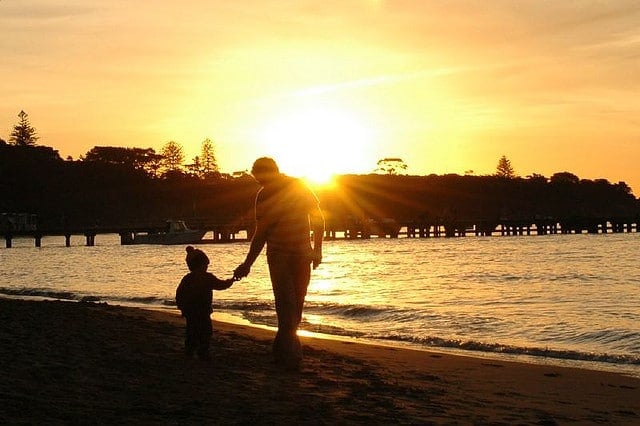
by Mirjam | Aug 11, 2014 | Babies, Kids, Milestones, Motherhood, Netherlands, Older Children, Parenting, Teenagers, World Moms Blog
 I remember the day I gave birth to my firstborn very well.
I remember the day I gave birth to my firstborn very well.
After a long exhausting delivery, a baby boy was placed in my arms.
I remember feeling overwhelmed, I remember shaking from exhaustion.
But my fatigue and pain faded to the background, the moment I held him for the first time.
It wasn’t just a child that was born that day, a mother was also born and a love beyond comprehension.
Something in my mind and spirit opened up and I never saw the world the same way again.
From that moment on, I wept, whenever I saw the news.
With every casualty I realized that that was someone’s baby, someone’s child.
The irony is, that at the same time that an alertness and a desire to keep my baby close was awakened in me, a will and force to stand on his own was stirred up in him.
Yes, I had brought this little boy into the world, but he wasn’t mine. Yes, mine to hold, but for a short amount of time. He was born to walk his own course and to be his own person.
To emphasize this the cord binding us together was cut.
And thus started our walk together. His, a walk of learning to take his own steps and mine, a walk of loosening grip by grip.
“Hold my hand as you cross the street.”
“You get back here, young man!”
“Yes, you can walk ahead in front of me as long as I can see you”
“You may ride your bike, but you have to stay on the curb.”
I held him, carried him, I cheered him on.
I held his hand and accompanied him, I sometimes gave him a little push when he lacked confidence.
And on many, many occasions I held him back.
“No, don’t touch that, that’s hot.”
“No, you can’t watch that, you’re too young.”
“No, you can’t go there, that’s too far.”
And now I have to let him go beyond my grasp, beyond my sight.
A part of my job is done and my role is changing.
I can no longer hold him back.
I have to let him go yet a little further.
The other day I accidentally grabbed his hand as we were crossing the street. He quickly pulled his hand away and gave me a look fit for crazy people.
My mistake, I thought, for one moment I mistook you for the little boy you once were.
My little boy is going to high school.
Can someone please hold me now?
Do you have moments that you have trouble letting your child or children go?
This is an original post for World Moms Blog by Mirjam of the Netherlands. Mirjam also blogs at Apples and Roses.
Photo credit: kwanie. This picture has a creative commons attribution license.
Mirjam was born in warm, sunny Surinam, but raised in the cold, rainy Netherlands.
She´s the mom of three rambunctious beauties and has been married for over two decades to the love of her life.
Every day she´s challenged by combining the best and worst of two cultures at home.
She used to be an elementary school teacher but is now a stay at home Mom. In her free time she loves to pick up her photo camera.
Mirjam has had a life long battle with depression and is not afraid to talk about it.
She enjoys being a blogger, an amateur photographer, and loves being creative in many ways.
But most of all she loves live and laughter, even though sometimes she is the joke herself.
You can find Mirjam (sporadically) at her blog Apples and Roses where she blogs about her battle with depression and finding beauty in the simplest of things. You can also find Mirjam on Twitter and Instagram.
More Posts - Website
Follow Me:



by Katinka | Jul 28, 2014 | 2014, Adoption, Adoptive Parents, Being Thankful, Belgium, Birth Parents, Childhood, Contest, Cooking, Cultural Differences, Discipline, Ethiopia, Family, Food, Health, Kids, Life Balance, Motherhood, Multicultural, Nutrition, Parenting, Siblings, World Motherhood, Younger Children
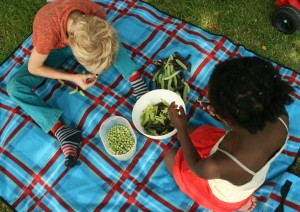 I’ve yet to meet a mom who is not monitoring her kid’s eating habits. Some might even be obsessed over it, others just make sure their kids eat enough or don’t overeat. Food can be filled with cultural, health or moral values and seems an important subject in most families I know.
I’ve yet to meet a mom who is not monitoring her kid’s eating habits. Some might even be obsessed over it, others just make sure their kids eat enough or don’t overeat. Food can be filled with cultural, health or moral values and seems an important subject in most families I know.
Every single one of the moms I know, seems to have her personal truth about food, or is at least searching for it. I know quite a few moms who vouch for strict vegetarianism, sugar free, all organic, low-carb, macrobiotic, low-fat or a mix of those. Others cook without lactose, gluten, sugar, eggs, nuts, soy and other allergy or intolerance boosters, by necessity or by conviction. But there’s also quite a number who just like to stick to their grandmothers’ favourite mashed potatoes with pork chops and piccalilli, because that’s what they were raised with.
Myself, I mix quite a bit of the above. My life is all about compromises. As a student, I used to be vegetarian, but now we eat vegetarian for only about 3 days a week. I also restrict the amount of lactose, because of my daughter’s (mild) intolerance. I make sure they eat at least one piece of fruit per day, but most days it’s two or three. And because we are Belgian, we have our two-weekly take out of ‘French’ fries, which originally came from Belgium. Or maybe even from Flanders.
I would not call myself obsessed, but I do keep a detailed mental track of what my kids eat in a day, and try to compensate by the 80/20 rule I adopted from a fellow World Mom: if they eat healthy for 80% of the time, that will make up for the 20% they eat junk.
When a mom has found her personal truth about food, obviously she wishes for her kids to eat by it; which they aren’t likely to do without a struggle. Not after they’ve tasted the Belgian fries, they won’t.
When my oldest was younger, I used to think I had it all together though. He ate whatever vegetable I gave him and his favourite dish was Brussels’ sprouts. I even recall quite some occasions on which I, the former vegetarian, bribed him into eating his meat by promising him an extra stem of broccoli. After a while, even the meat didn’t pose a problem anymore. He would eat whatever I served him.
Those good old days are over now.
It all started when our daughter arrived, age 2.5. She came from Ethiopia and was not used to our diet, not mentally, but also not physically. The first time I served her something green, she just threw it on the floor. Not out of a whim, but because she was clearly convinced it was not edible. She even tried to take it out of my mouth. Having been fed mashed dishes all her life, she was also not used to chewing. She did like bread and she did her best chewing it, but we had to take her to a physiotherapist to sooth her jaw pains. So we customized our cooking to her and introduced new stuff every once in a while. The one dish that never posed a problem was, indeed, our Belgian fries.
Meanwhile, our son, then 5, seemed to finally grasp that there was such a thing as rejecting food. I don’t know whether it was his sister’s example, the TV shows he started watching, his classmates or just normal evolution, but he started getting more selective each month. He also ate with his hands more often, just like his sister was used to. I went from having one kid with excellent eating habits to two picky, messy eaters.
After two years of convincing myself it was just a phase, this year I started implementing some strategies to get them to eat more balanced. Ultimately, what they were eating wasn’t all that bad but I was getting tired of the drama and the struggle to get them to eat what I believed was good for them. And most of all, I wanted them to develop the discipline to choose healthy by themselves, and not just because I ordered or rewarded them.
First, I tried the Yucky List. A colleague of mine had it at home, and it worked perfectly for her family. The idea is that it is only natural to have different tastes and that you don’t need to like everything. The concept is that each family member can have three dishes they really don’t like, on that list. When it is served, they are allowed to refuse it and have bread instead. Or hope for a mom who cooks two different dishes in advance. Of course over time, you can change your preferences but when a fourth dish you don’t like is served to you, you have to eat it, before you can put it on the list (replacing another).
It seemed promising but after a few weeks, the kids started to change their list about every other day. Way too many family dinners were filled with ‘I will put this on my yucky list for sure!’ and a lot of moaning and struggling, which didn’t really lighten the mood as I had hoped it would. We might pick it up again when they are older but for now, it doesn’t work for us.
After that, I changed my strategy to handing out a Yucky Coupon, Bah Bon in Dutch. I borrowed the idea from a friend who used to do cooking for youth camps. At these camps, each of the kids was given one Bah Bon for the duration of the camp. They could hand it in if they didn’t want to eat one of the meals that was cooked for them. Of course, they only could do that once. And the ones who still had the Bah Bon at the last day of camp, could hand it in, in exchange for ice cream.
So that’s how we do it now and it works like a charm! The kids both have their weekly Bah Bon, which is very conveniently posted on the magnetic wall next to the dinner table. Whenever they complain about dinner (or lunch or breakfast), we just point to their Bah Bon and remind them they can hand it in if they wish. No strict words, just giving them a choice and a visual reminder. Our son hasn’t missed his Sunday ice cream once. Our daughter has, once, and she’s not likely to miss another.
Of course, this will only work if ice cream is really a treat for your kids. Mine don’t really get candy or other sweets that often, so for them this works perfectly.
And of course, it’s still kind of a bribe. But I like it much more than the daily ‘If you don’t eat it, you can’t have desert’ bribe. For one, because we don’t have desert every day. Second, because they have to manage the discipline to work all week for their ice cream, rather than getting an instant reward. Third, because I don’t exactly sell the ice cream as a bribe or reward but rather as an interpretation of the 80/20 rule: if they eat healthy and balanced all week, it is all right to have something unhealthy every once in a while.
Most importantly, I like this system because the kids themselves really like this system. They like being in control of what they (don’t) eat without any pressure from us, and most of all they absolutely love our weekly ceremony when they officially hand in the Bah Bon they saved in exchange for their well deserved treat.
Do you have a personal or cultural take on the food you serve your kids? And do you need similar strategies to convince them about it?
This is an original post to World Moms Blog by K10K from The Penguin and The Panther.
The picture in this post is credited to the author.
If you ask her about her daytime job, Katinka will tell you all about the challenge of studying the fate of radioactive substances in the deep subsurface. Her most demanding and rewarding job however is raising four kids together with five other parents, each with their own quirks, wishes and (dis)abilities. As parenting and especially co-parenting involves a lot of letting go, she finds herself singing the theme song to Frozen over and over again, even when the kids are not even there...
More Posts

by World Moms Blog | Jul 22, 2014 | 2014, Family, Grandparent, Greece, Guest Post
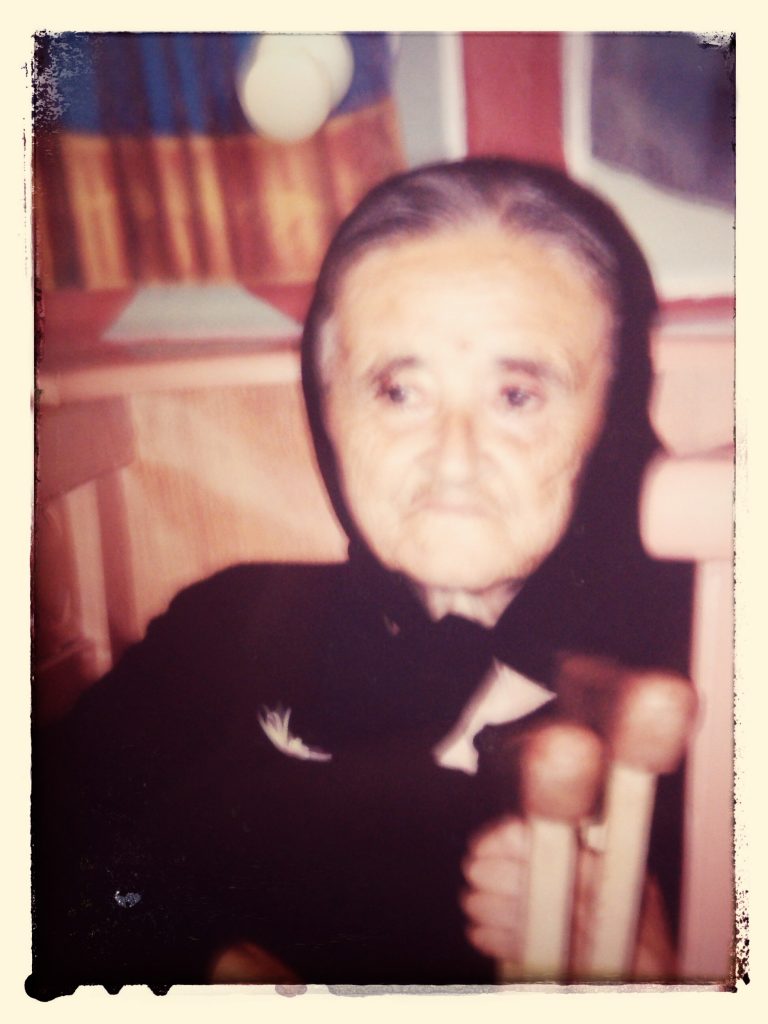
The Super Greek Gran of this story is pictured above.
The greatest invention EVER!!!
I hope that all you moms out there are coping with and even ENJOYING your summer vacation! Having kids at home all day and every day can be challenging even for the most organized, and creative of us, especially if we also have to work outside the home.
Do you have help with feeding, entertaining, and generally nurturing your offspring?
I wonder how many of you busy multi-taskers are as blessed and fortunate as I am to have a super-soulmate, super efficient ma-in-law to LITERALLY pick me up when I’m down and totally out of action…and yes, I did say
Mother-in-law.
I have been bedridden for a while and in excruciating pain due to 3 herniated discs on my spine which have plagued me for years. Yiayia (Greek for grandma) makes sure that I have priority in getting meals and having clean clothes, then gets to work doing the same for my hubby and two teenage sons. She makes mouth watering traditional Greek pies and delish soups, so believe me, it’s almost worth suffering flat on my back so that she makes her culinary delights for us!
It’s hard to believe she was born with a severe physical disability and has undergone a series of operations over the years on her legs and hips. Although she can only walk with the aid of crutches, her doctors say that it’s a miracle she is mobile at all! At 83 years old, I truly admre her abilities and her absolute dedication to her three children and their families. The great news is that she is typical of women from her culture and generation.
In Greece, Yiayia is greatly respected and in many households a godsend for working moms. Having a hot meal on the table when your tired daughter/daughter-in-law gets back from work is an example of what Greek grannies consider their duty. Believe me, these ladies REALLY know how to cook!!! Imagine the quality of food our offspring are getting as no Greek from this generation puts takeaway or prepacked food on the table. This would be an outrage! Only dishes based on the Mediterranean diet, passed down from generation to generation are considered good enough for nurturing a healthy family. Really great, right? So, even if at times you might not see eye to eye with the older members of your clan-Greeks are exceptionally clannish-then try to remember that goodwill, especially towards your mother-in-law, has more benefits than negative aspects!
I know that in most cultures around the globe the mother/daughter-in-law dynamic is considered to be one of the trickiest and sticky to manoeuvre.
Haven’t you ever felt at some point in your relationship with the in-laws that a fistful of Prozac or a bowl full of magic mushrooms would be a blessed relief?
Come on now-be honest!
More often than not one or both women feel a need to have the upper hand when competing for the attentions of hubby/son as well as children/grandchildren. At least in the beginning of the relationship with our new partner things can be pretty tumultuous until the boundaries and expectations are (hopefully) worked out.
My relationship with my Greek in-laws was definitely tumultuous when I first came to live in the family home 16 years ago! My husbands father was certainly NOT pleased when his boy came home with the XENI NIFI or foreign bride!!! Remember that great comedy; MY BIG FAT GREEK WEDDING ?
That wasn’t a comedy for me but MY LIFE!!!
It’s truly staggering how my relationship with my (now) beloved ma-in-law has progressed over the last one and a half decades! These days I think of Grandma Vasiliki as my own mother who ALWAYS supports me if I have a disagreement with her son. My poor hubby is pretty fed up hearing from his own mother that I’m more practical and wiser than he is (even if it IS true) and therefore I should have the final say in any major family decision making! I sometimes wonder if he rues the day he brought me to live in the family home. After all, the two women who are closest to him have become loving allies and so he can’t get away with anything. AT ALL! There are two sets of beady eyes constantly watching him…sound a little spooky? Well, I’m more than half Greek myself nowadays and I can tell you most Greek families really DO tend to live in each others pockets! I was actually born in the UK but such close proximity and familiarity would be considered very claustrophobic there. In Greece however, every family member feels they have a right to express an opinion about all things great and small, whether it concerns them directly or not! Usually Yiayia has the final pearl of wisdom to share…and more often than not is the wisest of all.
My husband has a great saying in Greek we use when we need a babysitter, cook, housekeeper or a shoulder to cry on. I find it hilarious although it loses something in translation;
“Greek Super Grans- the greatest invention EVER!”
Do you have a mom or mother-in-law to help out when things are tough?
Would you like someone to be this close to you and your family, or would you consider it too interfering and claustrophobic in your culture/part of the world?
What types of behavior would you find acceptable or not acceptable from a grandma?
Enjoy the rest of your vacation wherever in the world you may be!
This is a guest post by Ann Marie Wraight who lives in Greece.
World Moms Blog is an award winning website which writes from over 30 countries on the topics of motherhood, culture, human rights and social good. Over 70 international contributors share their stories from around the globe, bonded by the common thread of motherhood and wanting a better world for their children.
World Moms Blog was listed by Forbes Woman as one of the "Best 100 Websites for Women 2012 & 2013" and also called a "must read" by the NY Times Motherlode in 2013. Our Senior Editor in India, Purnima Ramakrishnan, was awarded the BlogHer International Activist Award in 2013.
More Posts

 As a trainer in intercultural communication and mom to multilingual children, I am always taught to accept other cultures, various ways of thinking and perspectives of looking at the world.
As a trainer in intercultural communication and mom to multilingual children, I am always taught to accept other cultures, various ways of thinking and perspectives of looking at the world.
















